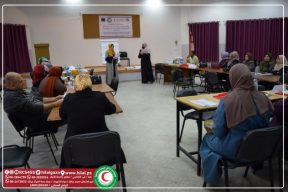EU-funded NGO hosts PFLP memorial event saluting terror group founder
Introduction
On January 29, 2022, the Popular Front for the Liberation of Palestine (PFLP), an EU-designated terrorist group, organized a memorial ceremony honoring PFLP founder (Badran Jaber; see also video), which took place at the hall of the Abdel Shafi Community Health Association (ACHA; formerly Red Crescent Society for the Gaza Strip [RCS4GS]) in Gaza. ACHA is also linked to the PLFP.
During the ceremony, a PFLP central committee member praised Badran Jaber, declaring that “he drew the weapons of Palestine very early on since he knew that the way to Palestine starts and ends with the rifle…May his pure spirit rest in great peace and we promise to stay on the same path which he and the rest of our comrade [PFLP] founders have paved.” (emphasis added).
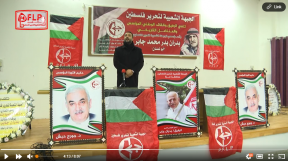
Source: PFLP media office
Two weeks earlier, on January 15, 2022, ACHA used the same hall to conclude an EU-funded five-day training on the subject of gender-based violence and case management. The workshop was part of a €648,000 project1 funded by the European Commission (EC).
Abdel Shafi Community Health Association links to the PFLP
The Gaza event is not the first time that the PFLP has organized events in the ACHA hall. For example, on September 29, 2021, ACHA hosted a PFLP-organized ceremony celebrating the release from prison of PFLP leader Khalida Jarrar. In 2019, Jarrar was arrested, together with tens of other PFLP members, and convicted of membership in the terror group. The arrests took place following an August 2019 bombing by PFLP members in which a 17-year-old Israeli civilian, Rina Shnerb, was murdered.
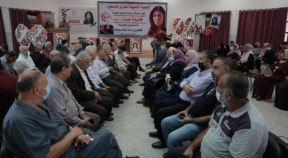
Source: PFLP
On July 12, 2020, the PFLP held an event in ACHA’s hall commemorating “the 48th anniversary of the martyrdom of the fighter writer PFLP Political Bureau member comrade Ghassan Kanafani.” Several PFLP senior officials – including Mariam Abu Daqa, Jamil Mazhar, and Iktimal Hamd – attended.
In February 2019, ACHA (at the time called RCS4GS) hosted a memorial service organized by the PFLP for Maher Yamani, PFLP “founder” and a “member of the Central Committee and one of its most prominent military commanders.” Yamani “coordinated special operations…in particular the operation against an aircraft of the Israeli company El Al in July 1968 in Greece.” “Fighters” of the PFLP’s Abu Ali Mustafa Brigades and “civil society representatives” attended the event (see photo below).
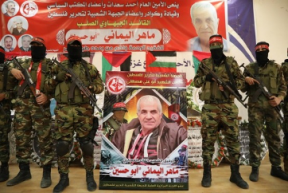
Source: PFLP
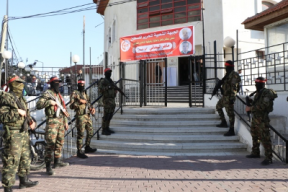
Source: Abu Ali Mustafa
In addition, several ACHA board members have served as members of the PFLP Central Committee and as board members at other PFLP-linked NGOs.
In a May 2020 article about “New European Funding Terms for Palestinian Civil Society Organizations,” General Director of the Palestine Red Crescent Society in Gaza Hatem Abu Al-Qaraya stated his objection to the conditional funding, describing the new European conditions as no different from the “renunciation of terrorism” conditions previously stipulated by USAID. Al Qaraya added that “in the event of an overall national [Palestinian] refusal to the conditions, the European Union will be forced to change its terms.”2
Notably, in July 2020 NGO Monitor alerted EU diplomats about the ties between ACHA (at the time called RCS4GS) and the PFLP (on file with NGO Monitor).
EU funding and investigation
In May 2021, following an Israel Security Agency announcement that it had uncovered a network of NGOs that diverted humanitarian assistance from European governments to the PFLP,3 the European Commission was reported to have “suspended EU funding to Al‑Haq and has instructed Oxfam to cut funding to the Union of Agricultural Works Committees until the situation has been clarified.” 4
In parallel to the suspension of funds to these two NGOs, which were designated by Israel as terrorist organizations in October 2021, EU’s Anti-Fraud Service (OLAF) opened a preliminary terror financing investigation into European Commission support for PFLP-linked Palestinian organizations.5 (In November 2020, NGO Monitor filed a complaint with OLAF regarding EU funding to terror-linked NGOs.)
Yet EU funding for projects involving additional PFLP-linked NGOs, including ACHA and Palestinian Centre for Human Rights (PCHR), continued, despite statements by EU officials declaring that the bloc does not fund terror-linked groups. This financial support occurs in parallel to multiple EU anti-terror-financing policies and investigations on this issue:
- In an April 2021 vote on its annual budgetary report, the European Parliament declared that EU funds cannot be allocated or linked to any cause or form of terrorism and/or religious and political radicalization.
- In July 2020, EU High Representative/Vice-President Joseph Borrell confirmed in a response to a parliamentary question that terror related offenses by senior employees or officials by EU NGO grantees would constitute a breach of contractual obligations by clarifying that “these [safeguards and] rules make the participation of entities, individuals or groups affiliated linked or supporting terrorist organizations incompatible with any EU funding” (emphasis added).
- On May 19, 2020, EU Commissioner for Neighborhood and Enlargement Olivér Várhelyi stated that he had instructed the heads of the EU delegations to Israel and the West Bank/ Gaza to “look deep[ly]” into allegations that some EU funds go to terror-linked or terror-supporting NGOs, declaring that such funding “will not be tolerated.” As of October 2021, no information about this internal review has been made public.
Footnotes
- In 2020-2023, the EU is providing €648,000 for the “Protection and respect of the rights of vulnerable women and girls with and without disabilities survivors of GVB in the Gaza strip” (2020-2023). The project is implemented by Women’s Affairs Center Gaza, Qatar Red Crescent, and RCS4GS/ Abdel Shafi Community Health Association.
- Translated by NGO Monitor
- According to Israeli authorities: “Popular Front organizations (PFLP-affiliated NGOs) deceived assistance organizations in Europe using various methods – reporting fictitious projects, transferring false documents, forging and inflating invoices, diverting tenders, forging bank documents and signatures, reporting inflated salaries, etc. The considerable financing that was received was transferred – inter alia – to payments for the families of Popular Front ‘martyrs’, salaries for militants, recruiting new members, advancing and strengthening terrorist activity, funding Popular Front militants in Jerusalem and the dissemination of Popular Front messages and ideology” (emphasis added).
- This claim was made by several MEPs in a parliamentary question.
- It appears that the information was provided on July 14, 2021, by the Belgian Minister of Development Cooperation and Major Cities Policy, during a foreign affairs committee meeting.
